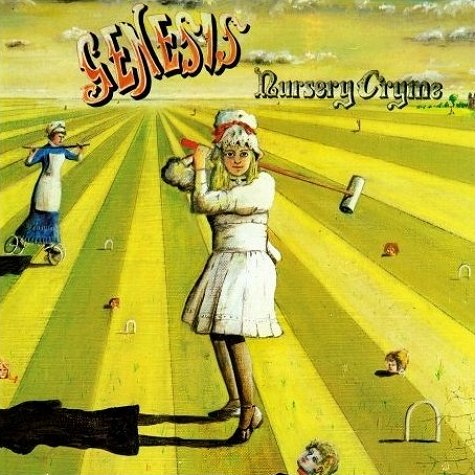
Nursery Cryme (1971)

1.The Musical Box
2.For Absent Friends
3.The Return of the Giant Hogweed
4.Seven Stones
5.Harold the Barrel
6.Harlequin
7.The Fountain of Salmacis
By the time Genesis released their third album, Nursery Cryme, things were finally starting to gel—at least on paper. After the noble but ultimately unremarkable Trespass, the band was now sporting what would go on to become their most iconic early lineup. Out went original guitarist Anthony Phillips, who left due to health and anxiety issues tied to touring. In came Steve Hackett, found through a modest ad in Melody Maker. On drums, John Mayhew was quietly shown the door, replaced by a guy named Phil Collins—yes, that Phil Collins—who was still just a talented unknown with a knack for perfect meter and surprising vocal chops.
Right out of the gate, you could tell this was a better band. Hackett brought a level of technical sophistication and tonal experimentation that Phillips just didn’t have. Collins, meanwhile, wasn’t just a far better drummer—he also happened to blend beautifully with Peter Gabriel’s voice. For now, he’d just be lurking in the background on harmonies and occasional leads, but the seeds were clearly being planted.
As cliche as it sounds, this album defined the quintet, and is leaps and bounds better than it's predecessors. Nursery Cryme is a monstrous step in the Genesis evolution, no doubt. But calling it an outright masterpiece would be generous. Sure, the flashes of brilliance are incredibly bright scattered among tracks. This is a group that sounds like a group of very smart, very young musicians who have now found their voice.
One needs to look no further than that of the album’s opener, The Musical Box. This is Genesis’ first real epic. It’s got all the classic ingredients: the gentle 12-string intro, Gabriel’s whisper-to-a-scream vocal arc, Hackett’s guitar squeals, and an emotional climax that justifies the track’s ten-minute runtime. It’s messy in places, sure—but it’s also haunting, powerful, and unlike anything else the band had done up to this point. It would remain a concert staple for years to come, and deservedly so. This is the sound they were feverishly trying to find on Trespass.
Immediately following is a curious little piece, For Absent Friends. It’s the first ever Genesis song to feature Phil Collins on lead vocals, and it’s actually quite beautiful. Clocking in at under two minutes, it’s barely a sketch—but there’s a tenderness and melancholy here that hints at what Collins would later bring to the band in spades. Hackett, for his part, co-wrote the piece and gives it a delicate touch that makes you wish the band had developed it into something longer.
After that, things start to wobble a bit. The Return of the Giant Hogweed is often cited as a fan favorite, but truth be told, it’s a bit too chaotic and self-conscious for its own good. It sounds like the band is trying a little too hard to be strange and edgy, and the result lands somewhere between campy and cacophonous. It would get better in a concert setting. Seven Stones and Harold the Barrel follow in similar fashion—interesting ideas, but they don’t quite stick the landing.
The closer, The Fountain of Salmacis, is perhaps the most successful of the remaining tracks. It’s drenched in classical mythology and melodrama, but there’s a grandeur to it that works, even if the lyrics drift into pretentious territory. Musically, the band is tighter and more confident, and the layered keyboards from Tony Banks hint at what was coming next.
Overall, Nursery Cryme is an essential listen—not because it’s perfect, but because it shows the band taking crucial, large steps toward greatness. It’s also the first time Genesis starts to sound like Genesis. The lineup is in place, the ambition is clear, and even though not every experiment works, the band is finally on the right track. Better things were just around the corner.
Go back to the main page
Go To Next Review